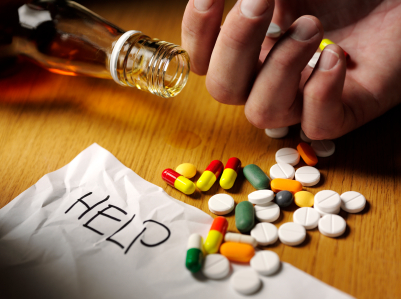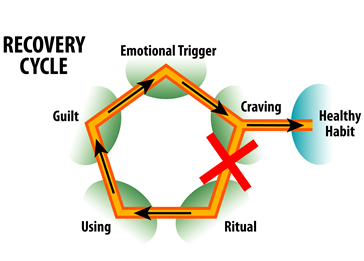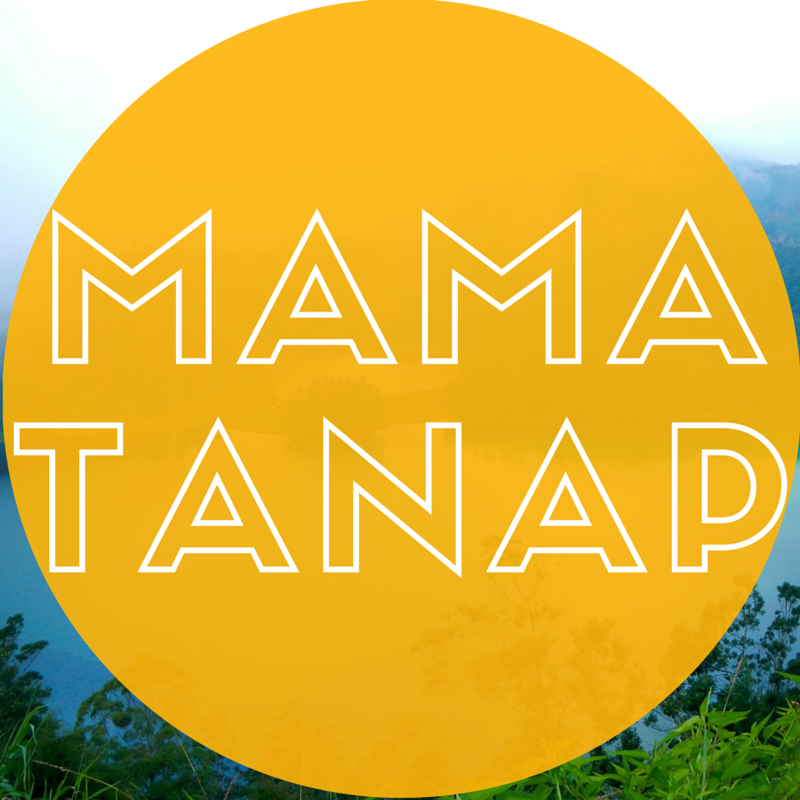
When we hear “mental illness,” we automatically think of anxiety disorders, such as post-traumatic stress disorder (PTSD) and obsessive-compulsive disorder (OCD). We think of mood disorders, the most common being depression, mania, and bipolar disorder. We also think of psychotic disorders (where an individual’s awareness and thinking is greatly distorted) such as Schizophrenia. There are many types of mental illnesses, which will be discussed at further length in future posts on this blog.
But what about if someone has an addiction?
According to the National Institute on Drug Abuse, addiction is a type of mental illness. Contrary to societal belief, an addiction (be it a substance or drug addiction), can actually alter the brain. An individual’s basic needs may then be replaced with “new priorities connected with procuring and using the [substance or] drug.” Thus, compulsive behaviors become more evident, which may reflect warning signs for additional mental illnesses.
It has been thought that habits can develop into addictions. However, once it is an addiction, it can no longer be considered a habit. One cannot simply break an addiction the way one breaks a habit. It’s interesting to note that Merriam-Webster defines the two as such:
habit – a usual way of behaving; something that a person does often in a regular and repeated way
addiction – compulsive need for and use of a habit-forming substance (such as heroin, nicotine, or alcohol) characterized by tolerance and by well-defined physiological symptoms upon withdrawal; persistent compulsive use of a substance known by the user to be harmful
Habits, whether they are positive or negative, are not destructive in nature. They are established when an individual carries out a particular action repeatedly. The brain thus sends signals to the body to act a certain way in any given situation. Examples of habits include fidgeting, procrastinating and nail-biting.
Addictions may develop from a habit. The key difference between a habit and an addiction is that a person has no control when they are addicted to something. With this loss of control, a person has trouble abstaining from an act or substance. He or she becomes dependent on their addiction, and may even suffer from withdrawal. Some brain functions, such as memory, decision-making and learning, may be affected as well. Like habits, addictions are very difficult to change. While addressing addictions often requires professional help, it should be noted that many addictions can cause physical harm to one’s body. Once an addiction has control over an individual, it becomes a necessity in order for the body to function. Addictions are thus more intense and developed versions of habits. They are dangerous.
How can I tell if I (or someone I know) has an addiction?
By making note of your habits and activities, you can point out if your habit is actually a dangerous addiction. Author Susan Shapiro raises some questions that you should consider if you think you have an addiction. If you do have an addiction, take action immediately. Seeking professional and/or medical attention when your health is at stake is always advised.
How does one address this mental health issue, be it a habit or addiction?
There are many ways in addressing this mental health issue, including learning more about drug and alcohol addiction and existing treatment. Project Know provides comprehensive information on addictions and local resources.
And while there is no individual pathway that works well for each person, recognizing that there is a problem and speaking up about it are among the first couple of steps. There are also several holistic approaches to addressing addiction as well, especially if seeking professional help may not be a viable option due to financial constraints, lack of medical insurance, and other restricting factors.


In Unhooked: How To Quit Anything, Dr. Frederick Woolverton and Susan Shapiro provide holistic instructions for addressing habits and addictions. The book does not advocate for a single approach, such as professional therapy, rehab, or a 12-step program, though these and other traditional methods are discussed. Woolverton and Shapiro also discuss “how to thrive without self-medicating,” an act which is prevalent among those who may not feel comfortable seeking professional help or simply expressing their concerns among their own network of family and friends.
Therese J. Borchard of Psych Central discusses twelve ways to beat addiction. Her twelve points also provide more of a holistic approach as well. Rather than numbered steps, these are guidelines one can start to incorporate into their daily lives in order to end an addiction.
A great narrative, which I found to be very helpful as far as understanding what goes on (mentally, emotionally and physically) with someone who lives with addiction, is A Million Little Pieces. In this memoir, James Frey presents an account of his experience in rehab, and his decision to end his various addictions.
Living with an addiction isn’t easy. However, ending an addiction starts with a choice. That choice lies with the individual with an addiction, and no one else.


A great read. Thank you for posting.
LikeLiked by 1 person
Thank you for reading! I appreciate your support and kind words. Do let me know if there are any particular topics you’d like to see discussed on the blog. Also, feel free to “Like” or “Follow” the blog. There are links on the right-hand module.
LikeLiked by 1 person
Right now I’m learning about CBO’s (non-profit sector) and advocacy. It’s my goal to start or join one to create a program that helps parents with mental challenges parent, set standards and guidelines for parents in custody disputes that help guide judges and others sort through the stigma and focus on what the parents capabilities are and if proper coping skills and structure is in place to parent and establish services that help parents with mental disabilities to parent. I’ve searched and haven’t been able to find anything of that nature anywhere — if you’re aware of something, I’d love to hear more about it. Do please keep writing — your articles are great and on point with incredible information.
LikeLiked by 1 person
Wow, sounds like you’re doing some great work. That’s definitely an area that is largely underserved in the mental health field. I’ll have to do some digging, but I know of a family where both of the parents live with mental illness, and decided to have a child. Their son lives a challenging life, so I’ll have to see if I can get more information as far as resources and services that are available to them.
Thank you again for sharing your thoughts; would love to connect further (beyond WordPress comments) in the future. I’ll shoot you an email soon!
LikeLike
QuirkyBirdWords — Would love to hear an update about your goal that you mentioned.
I’m not sure if you’ve been in touch with your local NAMI chapter, but they may have some resources. Each NAMI affiliate functions independently, so perhaps it’d be good to check with them directly. You can find them here: https://www.nami.org/Find-Your-Local-NAMI. I say this now because I’m currently working with a NAMI chapter that has a great deal of resources and presence in the region. Prior to my work at this particular chapter, I hadn’t worked as closely with one, so I was unsure.
LikeLike
Hi Ryann, I volunteer with NAMI Fresno now 🙂 and became a board member in January. Working hard here. Haven’t worked towards that goal in an official way but have networked for information and looking to talk with others to help support and launch that cause. I’m but one, and this will need many. 🙂 I have started a social media awareness campaign, request really, to help break the stigma of being labeled a 5150 and stop candor of folks who don’t get that they’re mocking a deep health crisis similar to cancer and Down syndrome by using the term to describe their choice to misbehave. https://quirkybirdwords.wordpress.com/2015/04/18/the-real-5150-a-social-media-awareness-campaign/ — Would love to collaborate with you on social media awareness and stigma busting. 🙂
LikeLike
Great article, you have truly encompassed the main points of addiction. Though we shouldn’t forget how the family is affected. I therefore recommend an excellent book authored by a Meth addict which captures the horrific essence of the cycle perpetuated by addiction. “Tweak: Growing Up On Methamphetamines” – Nic Sheff
LikeLike
Thanks for the suggestion! I’ll definitely see if I can get my hands on a copy soon.
Please do continue to check out the blog for future posts. Also, if there’s a topic you’d like to see discussed here, or you know of any other resources I should look into, feel free to share!
LikeLike